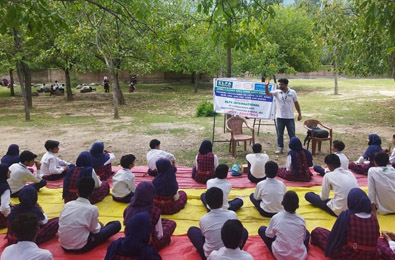
Environment Education & Conservation
Have you ever contrasted the glistering and sparkling waters of Dal and other water bodies, as seen in pictures from past with their present day mucky and filthy state? Have you ever contemplated the reasons behind this catastrophic and unhealthy change? And for that matter are you observing the change of pattern in our forest cover, conversion of eco-sensitive belts into industrial and residential areas? The emerging repercussions, as they manifest in calamities like extreme weather conditions, shifting of climatic belts and abnormal temperature deviation, must have caught your attention. While these things are happening locally, scientists warn us of much severe climatic concerns that await us and the recurrence of Ice Ages, which wiped out many species from the surface of Earth in its early history may again be around the corner and in one sweep on climatic catastrophe an overwhelming diversity of species may be erased from the planet.
Almost every hour, a news item or a research article hits the internet that is directly linked to the environmental change and the consequences thereof – such is the gravity of the issue. What has been our response – Individual and collective to these changes, changes at which is staked our future, not only future but the question of our existence, survival and subsistence. The severity and seriousness may be yet to dawn on us, but on the question of environmental stability and sustainability is hinged the future course of entire humanity. Its slow motion (Though it has fast forwarded during the last few decades) deludes us into believing as if all is well, but the melting snow-caps, the fast vanishing glaciers, spiky flash floods and such other visible and tangible parameters awaken us to the deeper mess, the hidden danger and the inevitable tragedy that we might collide with if timely and necessary measures aren’t brought into action without further delay. The question of response, which we referred to above, follows the top – down trajectory in a colossal problem like environmental degradation and its protection. That’s precisely the reason that international organizations and their affiliated countries have risen to the task and have started adopting and implementing universal policies and methodologies to safeguard the precarious environmental balance and to minimise any further stress on environment that may ultimately steer it to the point of rupture. As carbon and its compounds called Hydrocarbons are chief miscreants in destabilising environment and causing temperature abnormalities, the global community has set before itself the primary task of reducing Carbon emissions. Alternatives are being worked upon and efforts are accelerated to harness the eco-friendly, sustainable and non-polluting energy sources like Solar, Hydel, Geothermal etc. The industrial wastes are being subjected to proper decomposition techniques, residues are ingested to treatment plants and parallels like electric vehicles, solar photovoltaics are explored to meet growing energy demands without compromising on environmental safety parameters.
ELFA International is committed to the cause of Climate Change and Environment Sustainability (CCES) and has massively mobilized its resources and logistics to sensitise people on environmental issues, to launch vigorous advocacy with government agencies and to draw the attention of public and authorities towards this issue. As a part of its ongoing and untiring efforts, ELFA International in the year 2018 organized a program cum cleanliness drive in collaboration with six government departments including LAWDA, State Disaster Management Department, Health, SMC, Police and non-government organizations, schools, institutions and activist to identity and address the issues concerning the environmental degradation. On similar lines, ELFA International also organized several workshops and massive Dal Lake cleaning drives in collaboration with Global Citizen Journey USA, local schools, organizations and institutions. Organization believes in vigorous and proactive involvement of activists, students, government and non-government organizations and local community members to address the environmental issues to make sustained efforts to save Dal Lake - the crown of Srinagar city. Organization, in its bid to foster the stability environment, the wildlife and the precarious eco-balance also planted 1000s of trees in the districts of Kupwara, Srinagar and Pulwama involving various stakeholders.